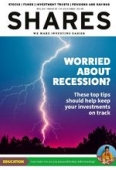Archived article
Please note that tax, investment, pension and ISA rules can change and the information and any views contained in this article may now be inaccurate.
Want a global tracker fund but not sure how they differ? Read this

Thousands of investors are looking for easy options to get exposure to stocks around the world. One route is to buy a tracker fund or an exchange-traded fund that mirrors the performance of a global index.
Two of the most popular indices used by global tracker funds are MSCI World and MSCI All Countries World (also known as ACWI), yet interestingly neither feature in a product by Vanguard, which has been growing in popularity in recent years.
Vanguard FTSE Global All Cap Index Fund (BD3RZ58) aims to replicate the performance of the FTSE Global All Cap index, which differs to the two MSCI global indices by providing exposure to smaller companies as well as large and mid-cap stocks.
MSCI World tracks the performance of approximately 1,500 large and mid-cap companies across 23 developed market countries. MSCI All Countries World does the same and adds 24 emerging market countries, resulting in coverage of nearly 3,000 companies.
FTSE Global All Cap goes even further and tracks a basket of approximately 9,400 companies. This is a market capitalisation weighted index which means companies with the largest market value will have a higher allocation than those with a smaller market value. As a result, larger companies still dominate its performance.
Exposure to more companies doesn’t necessarily lead to greater returns. Over five years to 7 July 2022, total return in sterling for the MSCI World was 57.7%. The FTSE Global All Cap returned 54% while the MSCI All Countries World was 52.5%.
On a 10-year basis, there is more of a difference, with the MSCI World again on top by delivering a 226.5% return. The FTSE Global All Cap was second with a 216.9% return and the MSCI All Countries World was third with 203.3%.
Ultimately, all three indices provide exposure to a large bucket of companies around the world, providing diversification in terms of geographies, sectors and economies. Any one of them should do the job for an investor seeking a simple way of tracking global stock market activity.
If you want to go down that route, it’s worth comparing the charges for each relevant tracker fund or exchange-traded fund as these can vary between fund providers.
For example, Vanguard FTSE Global All Cap Index Fund charges 0.23% a year versus 0.2% from iShares Core MSCI World ETF (SWDA) and 0.4% from SPDR MSCI ACWI ETF (ACWI).
Important information:
These articles are provided by Shares magazine which is published by AJ Bell Media, a part of AJ Bell. Shares is not written by AJ Bell.
Shares is provided for your general information and use and is not a personal recommendation to invest. It is not intended to be relied upon by you in making or not making any investment decisions. The investments referred to in these articles will not be suitable for all investors. If in doubt please seek appropriate independent financial advice.
Investors acting on the information in these articles do so at their own risk and AJ Bell Media and its staff do not accept liability for losses suffered by investors as a result of their investment decisions.
Issue contents
Education
Feature
Great Ideas
News
- Collapse of Elon Musk’s Twitter deal could spark Tesla share price recovery
- Kistos aims for £1 billion tie-up with Serica to create North Sea oil and gas champion
- The 2022 AGM season is seeing shareholder rebellions on pay gather pace
- The big US companies reporting over the next week and what it could mean for the economy
- Latest Fundsmith letter offers investors comfort despite tough market conditions
 magazine
magazine








